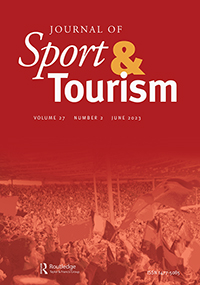Predicting Japanese sport tourist behaviour: An extension of theory of planned behaviour with tourism ideal affect
公開日 2023.07.18

A research article by CTR Visiting Fellow, Dr. Eiji Ito (Chukyo University, Japan) has been published in an international journal, Journal of Sport & Tourism. This research was supported by CTR Research Project Support Fund.
Title
Predicting Japanese sport tourist behaviour: An extension of theory of planned behaviour with tourism ideal affect
Author
Eiji Ito, School of Health and Sport Sciences, Chukyo University, Toyota, Japan / Center for Tourism Research, Wakayama University, Wakayama, Japan
Source
Journal of Sustainable Tourism
https://doi.org/10.1080/09669582.2023.2177301
*Indexed in Scopus
https://www.scopus.com/sourceid/19900191762
Abstract
Theoretically-informed studies and theoretical integration remain overdue in the field of sport tourism. This study focused on the theory of planned behaviour (TPB) for a critical engagement with the theory that researchers have already been employing in sport tourism research, and tourism ideal affect developed based on the affect valuation theory for those that have yet to be critically applied in sport tourism. The study aimed to investigate (a) TPB’s predictive power of intention and actual behaviour in sport tourism contexts, and (b) whether such predictive power can be enhanced by adding tourism ideal affect. Two-wave data collection was implemented in Japan, involving 418 adults. The findings demonstrated that TPB could significantly predict intention and actual behaviour in sport tourism contexts. Subjective norm predicted intention, while intention predicted sport tourism behaviour. Although adding tourism ideal affect did not improve the predictive power of intention and actual behaviour, tourism ideal low-arousal positive affect was found to be negatively related to sport tourism behaviour. Along with theoretical contributions, this research suggests that strengthening promotions involving tourists’ significant others (e.g. adding family components) by targeting Japanese people who have a lower level of tourism ideal low-arousal positive affect may be an effective approach to further sport tourism development in Japan.
Keywords
Sport tourism, Tourism ideal affect, Theory of planned behaviour, Japan

